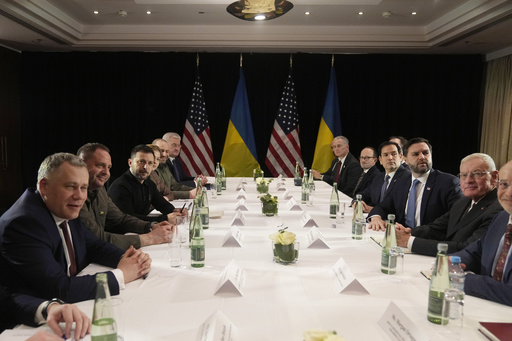In a recent development concerning the ongoing conflict in Ukraine, the administration of President Donald Trump appears to be pursuing a strategy that has sparked concern among European allies and Ukrainian officials. They fear that they are being gradually sidelined as direct negotiations between the U.S. and Russia are being organized. Secretary of State Marco Rubio, National Security Adviser Mike Waltz, and Special Envoy Steve Witkoff are expected to travel to Saudi Arabia for discussions with Russian representatives, as revealed by an anonymous U.S. official.
The extent of involvement from Ukrainian and European officials in these forthcoming talks remains uncertain. The U.S. views these negotiations as still in their early stages, which may allow for changes in the participant list as discussions progress. During a press briefing, Trump briefly mentioned that Ukrainian President Volodymyr Zelenskyy “will be involved” in the negotiations, without elaborating on the specifics.
This diplomatic effort follows recent statements from top advisers in Trump’s administration, including Vice President JD Vance, which have heightened concerns in Kyiv and throughout Europe. These comments suggest that the U.S. is leaning towards a swift resolution to the conflict with minimal consultation from European nations. Zelenskyy remarked at the Munich Security Conference that the traditional relationships between Europe and the U.S. are evolving, urging Europe to adapt to new political realities.
In response to worries about a lack of European involvement, White House officials defended their position, asserting that the continent has not been excluded from the negotiation process. Recently, Trump held discussions with French President Emmanuel Macron and is expected to speak with British Prime Minister Keir Starmer within the week. Vance’s meetings in Europe included conversations with several key leaders, emphasizing that European states are indeed being consulted, although some may disagree with the current negotiation dynamics.
Rubio, who traveled from Israel to Saudi Arabia, stated that the administration is adopting a careful stance in its re-engagement strategy with Moscow, reclaiming communication channels that had been limited by the previous administration. Following a call with Russian President Vladimir Putin, Trump indicated that the two leaders had agreed to initiate high-level discussions aimed at ending the war, while emphasizing Ukraine’s eventual involvement.
It is yet to be confirmed whether Ukrainian representatives will participate in the Riyadh talks. Reports indicate that a Ukrainian delegation is already in Saudi Arabia, preparing for a potential visit from Zelenskyy. Starmer expressed in a recent column that it’s crucial for Ukraine to be part of any discussions concerning its future, highlighting the potential backlash of not including Kyiv in the negotiations.
Trump expressed his belief that Putin is motivated to reach a deal, acknowledging Russia’s formidable military history. Trump noted, “I think he wants to stop fighting,” reflecting on the power dynamics of past conflicts. Concerns persist, however, as some officials within the administration hold differing views on how quickly to reconcile relations with Russia, especially in consideration of Putin’s regional ambitions.
Last week, Trump mentioned that he would favor Russia being reinstated in the G7, accentuating his stance that their ousting after the 2014 annexation of Crimea was regrettable. Meanwhile, the upcoming talks are clouded by ongoing discussions concerning Ukraine’s rare earth mineral deposits and U.S. military aid, inciting further scrutiny of the negotiations.
Zelenskyy, during a meeting with Vance in Munich, instructed his minister not to agree to certain proposals presented by the U.S., citing concerns over the inadequate focus on Ukraine’s security. The White House criticized this decision as “short-sighted,” positing that an agreement on rare earth minerals would reinforce ties between Ukraine and the U.S., which Moscow opposes.
European officials have also expressed unease regarding some of Vance’s comments during his recent visits, in which he discussed controversial topics such as free speech and migration issues. His assertions suggested that public support in Europe could dwindle unless immediate action is taken, stirring further discontent among European leaders.
Amidst this geopolitical backdrop, Macron is set to convene an urgent meeting of key European nations in Paris to deliberate on the next steps concerning Ukraine, indicative of a renewed effort for unity in response to the evolving U.S. strategy. French Foreign Minister Jean-Noël Barrot remarked on the tangible sense of solidarity currently perceived across Europe, suggesting a shared commitment to address the ongoing crisis.
